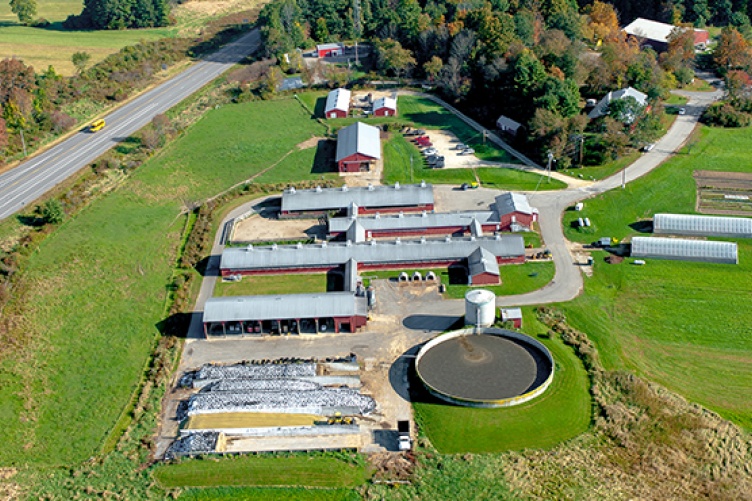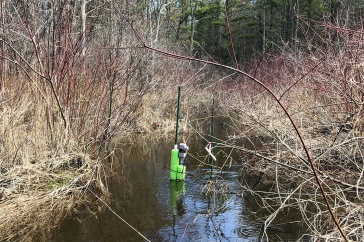
The Fairchild Dairy Teaching and Research Center, a facility of the NH Agricultural Experiment Station (NHAES) at the University of New Hampshire College of Life Sciences and Agriculture (COLSA), has been recognized by the state as a New Hampshire Quality Milk Producer.
The New Hampshire Department of Health and Human Services cited the farm’s efforts for 2014. The dairy farm had an average inspection score of 96 out of 100, and excellent scores related to animal health.
According to Chuck Metcalf, supervisor with the New Hampshire Department of Health and Human Services Dairy Sanitation Program, the state inspects dairy farms every six months. A passing score for an inspection is 90 with no critical items. Critical items include poor cleaning and sanitizing of equipment, improper handling of milk from cows that have been treated with antibiotics or are producing abnormal milk, poor cooling of milk, improperly operated or protected water supplies, and improperly stored or labeled drugs.
The state tests milk for a number of factors that indicate herd health, hygiene, and sanitation. Among those is the standard plate count and somatic cell count. Metcalf explained that the standard plate count is a bacteria count that measures the overall quality of the milk. High bacteria counts can be the result of poor cooling or poor sanitation on the farm and although the bacteria is killed during pasteurization poor quality milk does not have as long a shelf life as good quality milk. The state found the Fairchild Dairy’s average standard plate count for 2014 was 6,000/ml. The national standard plate count is 100,000/ml.
Dairy herds with a low somatic cell count tend to be more profitable herds since they have reduced treatment and veterinary costs for mastitis, which is the most common and costliest disease for dairy cattle, higher milk production per cow, and higher milk quality premiums. The state calculated the Fairchild Dairy’s average somatic cell count for 2014 at 134,000. The national standard for somatic cell count is 750,000/ml. Somatic cell counts higher than 200,000 to 300,000/ml are generally considered to be above the level expected in a healthy herd of cows.
The Fairchild Dairy Teaching and Research Center develops new knowledge and management expertise geared directly toward many state and regional stakeholders. It houses 87 milking-age Holstein and Jersey cows and approximately 70 growing, replacement animals. Included in that number is the 20-cow, student-managed Cooperative for Real Education in Agricultural Management (CREAM) herd, with the remaining animals devoted primarily to research in the area of dairy nutrition and reproductive biology.
Cows at the Fairchild Dairy Center produce an average of about 26,000 to 27,000 pounds of milk per cow per year, which is greater than the national average of about 22,000 pounds per cow a year.
The Fairchild Dairy Center has been long recognized for its quality milk and operations. In 2014, 2013 and 2012, the farm received the Gold Quality Award from the Dairy Farmers of America. In 2013, the farm received a Quality Milk Award from Dairy One for consistently producing high quality milk with a low somatic cell count. In 1997 and 2004, Dairy One also recognized the CREAM herd having the highest quality milk from among approximately 3,100 dairy herds on the official Northeast Dairy Herd Improvement Association (DHIA) test. In 1999, the farm was cited as a Dairy of Distinction by the Milk Sanitation Board, which in 2000 awarded it a Certificate of Quality.
The Fairchild Dairy Center is located at 36 O’Kane Road off Mast Road Extension in Durham. It is open to the public seven days a week from 8 a.m. to 6 p.m. Visitors can observe the milking of cows at 3:30 p.m. each day. Map: http://www.colsa.unh.edu/nhaes/directions/Fairchild.
-
Written By:
Lori Tyler Gula, PhD | NH Agricultural Experiment Station | lori.gula@unh.edu | 603-862-1452
















































